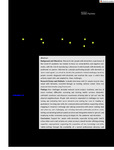‘Pushing back’: People newly diagnosed with dementia and their experiences of the Covid‐19 pandemic restrictions in England
| dc.contributor.author | Dixon, J | |
| dc.contributor.author | Hicks, B | |
| dc.contributor.author | Gridley, K | |
| dc.contributor.author | Perach, R | |
| dc.contributor.author | Baxter, K | |
| dc.contributor.author | Birks, Y | |
| dc.contributor.author | Colclough, C | |
| dc.contributor.author | Storey, B | |
| dc.contributor.author | Russell, A | |
| dc.contributor.author | Karim, A | |
| dc.contributor.author | Tipping, E | |
| dc.contributor.author | Banerjee, Sube | |
| dc.date.accessioned | 2022-11-04T15:53:51Z | |
| dc.date.issued | 2022-09-02 | |
| dc.identifier.issn | 0885-6230 | |
| dc.identifier.issn | 1099-1166 | |
| dc.identifier.uri | http://hdl.handle.net/10026.1/19850 | |
| dc.description.abstract |
<jats:title>Abstract</jats:title><jats:sec><jats:title>Background and Objectives</jats:title><jats:p>Research into people with dementia's experiences of the Covid‐19 pandemic has tended to focus on vulnerabilities and negative outcomes, with the risk of reproducing a discourse in which people with dementia are positioned as passive. Informed by concepts positioning people with dementia as <jats:italic>‘active social agents’</jats:italic>, we aimed to identify the pandemic‐related challenges faced by people recently diagnosed with dementia and examine the ways in which they actively coped with, and adapted to, these challenges.</jats:p></jats:sec><jats:sec><jats:title>Research Design and Methods</jats:title><jats:p>In‐depth interviews with 21 people recently diagnosed with dementia, recruited through an existing national cohort. Data was analysed thematically using Framework.</jats:p></jats:sec><jats:sec><jats:title>Findings</jats:title><jats:p>Key challenges included reduced social contact, loneliness and loss of social routines; difficulties accessing and trusting health services; dementia‐unfriendly practices; and disparate experiences of being able to ‘get out’ into the physical neighbourhood. People with dementia responded to challenges by maintaining and extending their social networks and making the most of ‘<jats:italic>nodding acquaintances</jats:italic>’; learning new skills, for communication and hobbies; supporting others, engaging in reciprocal exchange and valuing connection with peers; seeking help and advocacy and challenging and resisting dementia‐unfriendly practices; maintaining and adapting habitual spatial practices and being determined to ‘<jats:italic>get ou</jats:italic><jats:italic>t</jats:italic>’; and employing similar emotional coping strategies for the pandemic and dementia.</jats:p></jats:sec><jats:sec><jats:title>Conclusions</jats:title><jats:p>Support for people with dementia, especially during public health crises when carers and services are under pressure, should involve utilising existing capacities, appropriately supporting the acquisition of new knowledge and skills, ‘safety‐netting’ through the availability of a named professional, advocacy and support and use of ‘check‐in calls’ and creating supportive social and environmental circumstances for people with dementia to sustain their own well‐being.</jats:p></jats:sec> | |
| dc.format.extent | 10.1002/gps.5803- | |
| dc.format.medium | ||
| dc.language | en | |
| dc.language.iso | eng | |
| dc.publisher | Wiley | |
| dc.subject | active social agent | |
| dc.subject | active social citizenship | |
| dc.subject | assets-based | |
| dc.subject | autonomy | |
| dc.subject | coping | |
| dc.subject | Covid-19 | |
| dc.subject | dementia | |
| dc.subject | pandemic | |
| dc.subject | strengths-based | |
| dc.title | ‘Pushing back’: People newly diagnosed with dementia and their experiences of the Covid‐19 pandemic restrictions in England | |
| dc.type | journal-article | |
| dc.type | Journal Article | |
| dc.type | Research Support, U.S. Gov't, Non-P.H.S. | |
| plymouth.author-url | https://www.webofscience.com/api/gateway?GWVersion=2&SrcApp=PARTNER_APP&SrcAuth=LinksAMR&KeyUT=WOS:000928425000001&DestLinkType=FullRecord&DestApp=ALL_WOS&UsrCustomerID=11bb513d99f797142bcfeffcc58ea008 | |
| plymouth.issue | 10 | |
| plymouth.volume | 37 | |
| plymouth.publication-status | Published | |
| plymouth.journal | International Journal of Geriatric Psychiatry | |
| dc.identifier.doi | 10.1002/gps.5803 | |
| plymouth.organisational-group | /Plymouth | |
| plymouth.organisational-group | /Plymouth/Faculty of Health | |
| plymouth.organisational-group | /Plymouth/Faculty of Health/Peninsula Medical School | |
| plymouth.organisational-group | /Plymouth/Faculty of Health/Peninsula Medical School/PMS - Manual | |
| plymouth.organisational-group | /Plymouth/PS - Office of Vice Chancellor | |
| plymouth.organisational-group | /Plymouth/REF 2021 Researchers by UoA | |
| plymouth.organisational-group | /Plymouth/REF 2021 Researchers by UoA/UoA03 Allied Health Professions, Dentistry, Nursing and Pharmacy | |
| plymouth.organisational-group | /Plymouth/Users by role | |
| plymouth.organisational-group | /Plymouth/Users by role/Academics | |
| plymouth.organisational-group | /Plymouth/Users by role/Researchers in ResearchFish submission | |
| dc.publisher.place | England | |
| dcterms.dateAccepted | 2022-08-12 | |
| dc.rights.embargodate | 2022-11-5 | |
| dc.identifier.eissn | 1099-1166 | |
| dc.rights.embargoperiod | Not known | |
| rioxxterms.funder | Economic and Social Research Council | |
| rioxxterms.identifier.project | DETERMIND-C19: Impact of COVID-19 on people newly diagnosed with dementia and their family carers, a mixed method study nested in DETERMIND | |
| rioxxterms.versionofrecord | 10.1002/gps.5803 | |
| rioxxterms.licenseref.uri | http://www.rioxx.net/licenses/all-rights-reserved | |
| rioxxterms.licenseref.startdate | 2022-10 | |
| rioxxterms.type | Journal Article/Review | |
| plymouth.funder | DETERMIND-C19: Impact of COVID-19 on people newly diagnosed with dementia and their family carers, a mixed method study nested in DETERMIND::Economic and Social Research Council |


